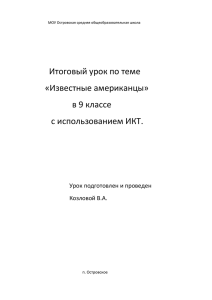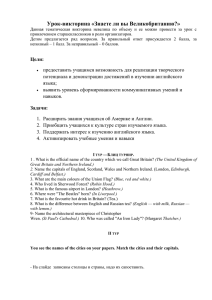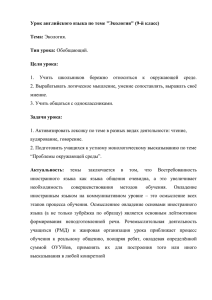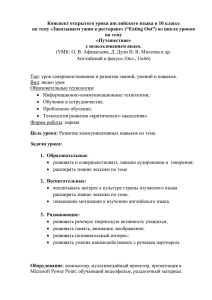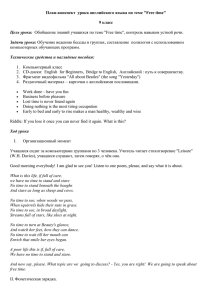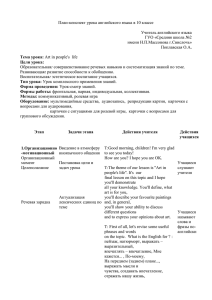Семенова Н.Я. P.I. Tchaikovsky. Конспект урока. 7 класс
advertisement
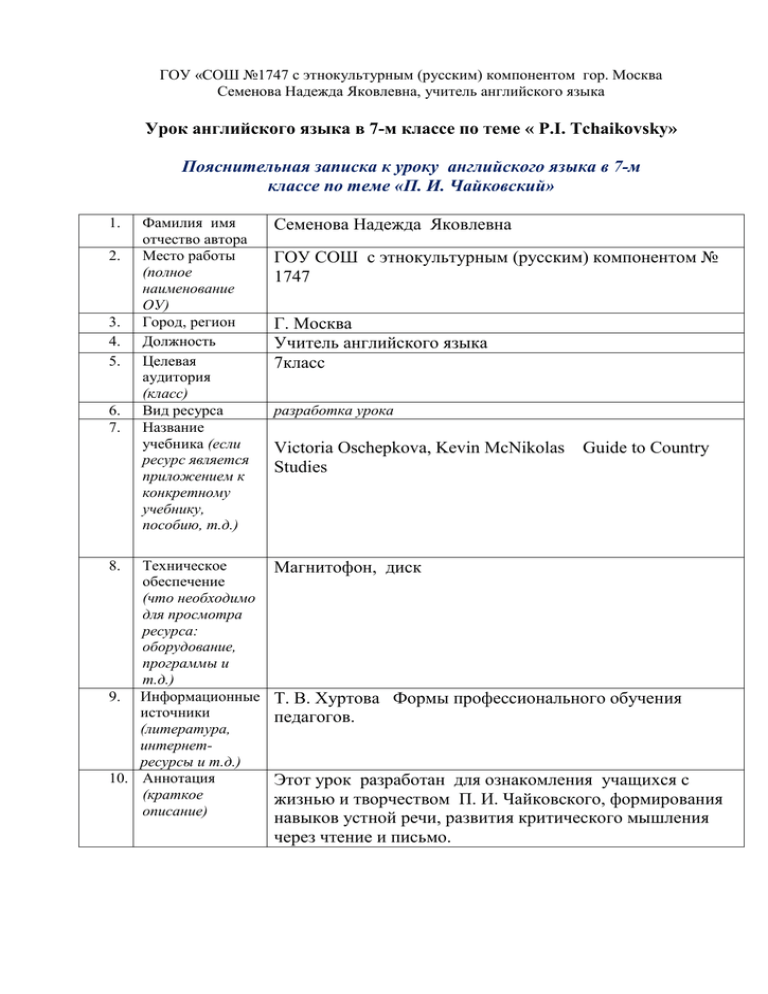
ГОУ «СОШ №1747 с этнокультурным (русским) компонентом гор. Москва Семенова Надежда Яковлевна, учитель английского языка Урок английского языка в 7-м классе по теме « P.I. Tchaikovsky» Пояснительная записка к уроку английского языка в 7-м классе по теме «П. И. Чайковский» 1. 2. 3. 4. 5. 6. 7. Фамилия имя отчество автора Место работы (полное наименование ОУ) Город, регион Должность Целевая аудитория (класс) Вид ресурса Название учебника (если ресурс является приложением к конкретному учебнику, пособию, т.д.) Техническое обеспечение (что необходимо для просмотра ресурса: оборудование, программы и т.д.) 9. Информационные источники (литература, интернетресурсы и т.д.) 10. Аннотация (краткое описание) 8. Семенова Надежда Яковлевна ГОУ СОШ с этнокультурным (русским) компонентом № 1747 Г. Москва Учитель английского языка 7класс разработка урока Victoria Oschepkova, Kevin McNikolas Studies Guide to Country Магнитофон, диск T. В. Хуртова Формы профессионального обучения педагогов. Этот урок разработан для ознакомления учащихся с жизнью и творчеством П. И. Чайковского, формирования навыков устной речи, развития критического мышления через чтение и письмо. Урок английского языка в 7-м классе по теме « P.I. Tchaikovsky» Семенова Надежда Яковлевна ГОУ СОШ № 1747 Учитель английского языка Цели урока: 1. Познавательный аспект: Познакомить учащихся с жизнью и творчеством Чайковского. 2. Учебный аспект: Совершенствовать умения и навыки практического владения английским языком по данной теме по разным видам речевой деятельности: говорению, чтению и письму. 3. Развивающий аспект: Учить работать самостоятельно, развивать критическое мышление. Учебно-методическое обеспечение: Victoria Oschepkova, Kevin McNikolas Guide to Country Studies T. В. Хуртова Формы профессионального обучения педагогов. Оснащение урока: магнитофон, диск с музыкой Чайковского, распечатанные тексты, таблицы. План урока Стадия вызова I. Сообщение темы и целей урока учащимся. II. Разминка: Учащимся даются слова, с помощью которых им предлагается составить короткие тексты о Чайковском. III. Учащиеся читают свои тексты IV Учитель показывает учащимся предложения о П. И. Чайковском, с которыми они должны либо согласиться, либо не согласиться. ( Работа с заставками) V. Учащиеся задают свои вопросы, ответы на которые им хотелось получить. Смысловая стадия I. Учащиеся читают текст о Чайковском (чтение текста со значками) Стадия рефлексии I. Заполнение таблицы. ( Индивидуально) II. Коллективное обсуждение таблицы. III. Возвращение к ключевым словам, заставкам и вопросам. IV.Домашнее задание: написать эссе или сочинение о Чайковском. Ход урока I. Teacher: Dear boys and girls! I am glad to see you at our lesson today because we have an unusual lesson-we are going to talk about Piotr ILiych Tchaikovsky and at the end of the lesson you will know a lot of information about him. On the blackboard you can see some words. Now you are going to make up and write down short texts about Tchaikovsky using these words . (На доске написаны слова, с помощью которых учащиеся должны составить свои предложение о нем, опираясь на собственную догадку и интуицию. Звучит музыка Чайковского) Слова на доске: Votinsk Engineer Nadezhda von Meck Money Professor French Music Divorce II. Pupil( один из учеников зачитывает свой текст) Tchaikovsky was born in Votinsk in the family of engineer, but soon his family then moved to St-Petersburg. He knew French and was very talented in music. He married Nadezhda von Meck and got divorced with her. Tchaikovsky was very rich and had a lot of money because he was professor of music. III. Teacher. Now look at the blackboard. You see some sentences. Agree or disagree with them. His mother was French. He had great musical talent because he was given piano lessons. He was married for only one week. He was born in Votinsk in 1900. He didn’t want to marry her patron’s daughter. He died after a long illness. ( учащиеся строят догадки, соглашаясь или не соглашаясь с ответами) IV. Teacher: You made up texts about Tchaikovsky, you made your suggestions about him, but you don’t know if they are correct. Please, tell me what would you like to know about the great Russian composer. Учащиеся задают свои вопросы: P1 When was he born? P2 Where was he born? P3 Was he a professor? P4 Did he marry Nadezhda von Meck? P5 Did he know French? P6 Did he die after a long illness? P7 What was his most famous musical works? V. Teacher: of course you will get answers to all these questions but before you should read the text about Tchaikovsky and make notes in your texts. If you knew this information about him put mark «V» – opposite the sentence. If you thought that it was different, put mark «_». If you didn’t know it at all, and it is a new information for you, put «+». If some information isn’t clear for you, put «?» Учитель раздает учащимся листки с текстами о Чайковском. Учащиеся читают тексты и делают пометки. Текст : Pyotr Ilyich Tchaikovsky. Pyotr Ilyich Tchaikovsky was born in Votinsk in 1840. He was the son of a mining engineer and his mother was of French ancestry. At a very early young age it was obvious that he had a great musical talent and so from the age of five he was given the piano lessons. Later he studied at the St.Petersburg Conservatory and later he became the professor of theory and harmony at the newly founded Moscow Conservatory and he held the post until 1878. In 1877 Tchaikovsky married a young student called Antonina Milyukova, but it was not a happy marriage. Soon after the wedding he tried to kill himself by walking into the icy river, but he survived and only nine weeks after the wedding day he left his wife and never lived with her again. However Tchaikovsky was a married man when he died as he and Antonina never got a divorce. For fourteen years he corresponded with a wealthy widow Nadezhda von Meck She insisted that they never meet, though they did accidentally encounter on a couple of occasions, but did not speak. As well as regular financial support Nadezhda von Meck was very supportive of Tchaikovsky musical career and admired his work. However, she suddenly cut off her support to Tchaikovsky for no obvious reason, but it is widely believed that she was unhappy with Tchaikovsky behavior. She hoped to marry one of her daughters to him, but after his previous unsuccessful marriage he refused. In addition he was deeply upset with the withdrawal of money and he still needed moral support. Russian composer Pyotr Ilyich Tchaikovsky wrote some of the most-recognized melodies of classical music, and his ballet The Nutcracker endures as a winter holiday favorite. He began composing in St. Petersburg in the 1860s, while studying and teaching music at the Conservatory. By the 1870s he was gaining public notice, and after 1878 he devoted himself to composing full time. Tchaikovsky's expressive melodies and orchestrations made him an audience favorite beyond Russia. Many of his works are part of the canon of classical music of the Romantic era, including the opera Eugene Onegin, the ballet Swan Lake, the overtures Romeo and Juliet and 1812 Overture and his Sixth Symphony, known as Pathétique. Just nine days after the first performance of his Sixth Symphony, in St Petersburg he died suddenly.he was buried in St Petersburg at the Aleksandr Nevsky Monastery. VI. Teacher: Now fill in the gaps. Учащиеся самостоятельно заполняют таблицу. В это время звучит отрывок из произведения Чайковского. I know that I thought different New information Not clear VII Teacher: Now I would like to listen to you. What did you learn about the great Russian composer Piotr Iliych Tchaikovsky? I want you to show the knowledge you got at the lesson today. Учащиеся отвечают на вопросы учителя. VIII. Teacher: Your home task will be to write an essay about Tchaikovsky.
